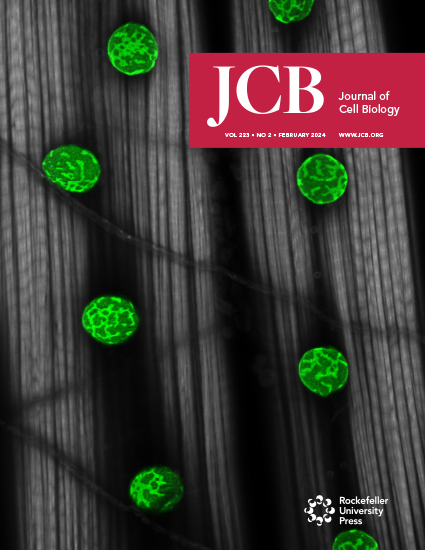scffbxo21介导的泛素化和NMNAT2降解调节神经损伤中的轴突存活。
IF 6.4
1区 生物学
Q1 CELL BIOLOGY
引用次数: 0
摘要
NMNAT2是轴突完整性必需但不稳定的蛋白质。它在神经损伤后迅速降解,促进轴突变性。然而,调控神经元中NMNAT2泛素化和转换的机制尚不清楚。在本研究中,我们发现F-box蛋白FBXO21是一种NMNAT2结合蛋白,其缺乏通过增加NMNAT2丰度来提供轴突保护。FBXO21招募SKP1、CUL1和RBX1形成SCFFBXO21复合物,在体内和体外促进NMNAT2泛素化。SCFFBXO21泛素化NMNAT2的K155位点,这是NMNAT2家族的异构体特异性靶向和相互作用域,这是NMNAT2独特的不稳定性质的基础。泛素化缺失的NMNAT2-K155R表现出显著减少的蛋白质周转和增强的轴突保护能力。最后,在Fbxo21基因敲除小鼠中,NMNAT2水平明显升高,损伤坐骨神经的存活时间明显延长。总之,我们的研究结果揭示了FBXO21在轴突退化中的关键作用,突出了SCFFBXO21复合物作为调节nmnat2依赖性轴突存活的潜在靶点。本文章由计算机程序翻译,如有差异,请以英文原文为准。
SCFFBXO21-mediated ubiquitination and degradation of NMNAT2 regulates axon survival in nerve injury.
NMNAT2 is an essential but labile protein required for axon integrity. It is rapidly degraded after nerve injury, promoting axon degeneration. However, the mechanisms regulating NMNAT2 ubiquitination and turnover in neurons remain unclear. In this study, we identify the F-box protein FBXO21 as an NMNAT2-binding protein, and its deficiency confers axonal protection via increasing NMNAT2 abundance. FBXO21 recruits SKP1, CUL1, and RBX1 to form an SCFFBXO21 complex, which promotes NMNAT2 ubiquitination in vivo and in vitro. SCFFBXO21 ubiquitinates NMNAT2 at K155 within an isoform-specific targeting and interaction domain of the family of NMNATs, which underlies the unique labile nature of NMNAT2. The ubiquitination-deficient NMNAT2-K155R exhibits substantially reduced protein turnover and enhanced axon-protective capacity. Finally, in Fbxo21 knockout mice, NMNAT2 levels are markedly increased and the survival of injured sciatic nerves is significantly prolonged. Collectively, our findings reveal a crucial role of FBXO21 in axon degeneration, highlighting the SCFFBXO21 complex as a potential target for modulating NMNAT2-dependent axon survival.
求助全文
通过发布文献求助,成功后即可免费获取论文全文。
去求助
来源期刊

Journal of Cell Biology
生物-细胞生物学
CiteScore
12.60
自引率
2.60%
发文量
213
审稿时长
1 months
期刊介绍:
The Journal of Cell Biology (JCB) is a comprehensive journal dedicated to publishing original discoveries across all realms of cell biology. We invite papers presenting novel cellular or molecular advancements in various domains of basic cell biology, along with applied cell biology research in diverse systems such as immunology, neurobiology, metabolism, virology, developmental biology, and plant biology. We enthusiastically welcome submissions showcasing significant findings of interest to cell biologists, irrespective of the experimental approach.
 求助内容:
求助内容: 应助结果提醒方式:
应助结果提醒方式:


